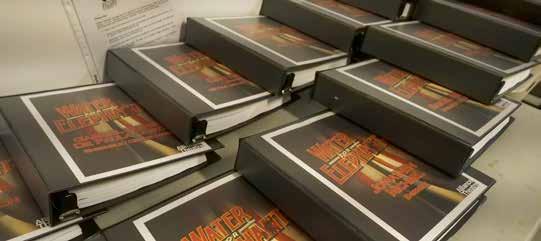
4 minute read
THE ELEPHANT IN THE ROOM
How Lost Boys and Their Wendy Brought Water for Elephants to the Coca-Cola Stage
STORY BY Ashley Elliott & Mashaun D. Simon
Usually when someone references “the elephant in the room,” they are referencing an issue or topic everyone is trying incredibly hard to ignore. With a show like Water for Elephants, the elephant in the room is impossible to ignore because she is at the center of the story.
“Rosie’s not merely a character,” says book writer Rick Elice, “But our theatrical, metaphorical approach to Sara Gruen’s story, writ large.”

Writ very large; she is an elephant, after all.
“Like every other character in our story, she’s not what she appears to be when we first meet her,” Rick continues. “In fact, the plot of our story turns on that very misunderstanding. Just wait for the moment — such a great moment! — when we discover how much more she is than what her vicious caretaker describes as ‘the dumbest creature on God’s green earth.’ Without her, there’s not only no elephant, but there’s also no Water for Elephants.”
As far as Rick is concerned, Water for Elephants is an unexpected coming-of-age story.
“[Director Jessica Stone] and I like to say this show is about what you do when you lose everything. The unexpected part is the coming-of-age of an old man, near the end of his life, feeling there’s not much reason to keep going, who changes course, proving it’s never too late to start over. As I’m in the middle of my life, these characters pull me in different directions, which is surprising and, in the theater, surprisingly affecting.”
As the creative team breathed new life into Sara Gruen’s classic tale, they were also inspired during the process of bringing it to life. The music, created by PigPen Theatre Co, guides the audience on a journey through time. Daniel Weschler, one of the seven founding members and songwriters of PigPen, said their decision to view the narrative through the lens of memory afforded them the opportunity to mix their unique and somewhat more contemporary sound with the sounds and idioms that were more familiar to the time in which the show is set — the American Great Depression era.
When Rick was initially approached six years ago by producers Peter Schneider and Jennifer Costello to adapt Sara’s novel, he had one request — that PigPen be part of the project. He’d seen their production of The Old Man and The Old Moon and became “obsessed [with] them and their music.”
“It was a big ask,” Rick admits. “I mean, you don’t usually have eight writers on one show. But Peter and Jen are very smart and very brave and they like to take risks.”
Once confirmed, Rick and PigPen started the long, arduous process of adapting the novel into something that could be managed — and managed well — onstage.

“Part of the challenge has been adapting to the many changes the script has undergone,” Daniel says. “Thanks to the highly collaborative and egalitarian creative process we shared with Rick, neither we nor he are content to force a square peg into a round hole. Whenever we made a discovery in the book, we knew we had to ensure the songs kept pace with what we were learning.”
Daniel and Rick also consider Director Jessica Stone a consummate partner in the production.
“She’s brilliant. She’s funny. She’s totally prepared and fast on her feet,” Rick says. “We were eight guys writing a different kind of show, and we must have seemed a little like the Lost Boys desperately in need of a Wendy.”
What audiences will see on the Coca-Cola Stage is an elaborate yet intimate spectacle. From a man on an empty stage to a train ride across Depression-era America to the spectacle of the circus, Daniel says that “the seamlessness with which we move between spectacle and grounded storytelling will be something [the audience hasn’t] experienced before.”
Rick has an interesting take on this journey the audience will take, saying he’s “a huge fan of theater’s ability to suggest and describe, rather than demonstrate.” Movies, he believes, require literal visuals — an actual train and an actual elephant, for instance.
“But in the theater, the opposite is true. We want to play along; we want to imagine in the theater.”
And if Rosie is as central to the story as Rick suggests, the story’s main character, Jacob Jankowski, is the perfect stand-in for us all.

“We all know what that’s like to ‘jump a train,’” Rick says. “To take a risk to find someplace, to belong somewhere, to be part of something — part of a group. So, while our show tells the story of this particular group, it’s hard not to be touched by those eternal issues of wanting to belong, wanting to achieve, wanting to be respected, wanting to find a home.”
Daniel is moved by Jacob’s drive to communicate with beings both human and animal.
“The sheer wonder he experiences whenever he meets an animal for the first time, from Queenie the mutt to Rosie the marvel — I find that very moving. That he and Marlena fall in love through their shared sense of extraordinary empathy is what first pulled me into the romance of the story.”
At the end of the day, Water for Elephants is a story about finding what it means to belong. While it’s set in the challenging years of the Great Depression, the story speaks to any and everyone who has felt marginalized and/or disenfranchised. If the phrase “water for elephants” is a metaphor for burdens one carries, the burdens are more easily carried when carried together.
“Life is more interesting, more challenging, more fulfilling, and more wonderful, when we are part of something bigger than ourselves,” says Rick. “This show is a dramatic reminder that it’s the people who help us with our heavy loads. They are, in fact, our home.”



